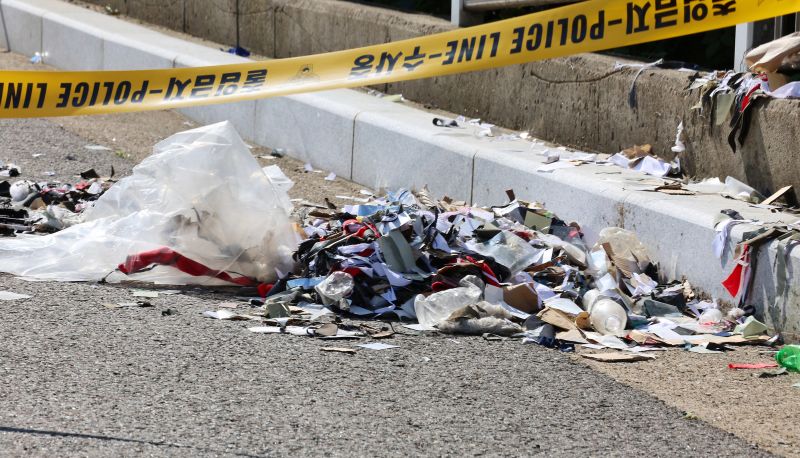North Korea has ramped up its trash-balloon operations, with Seoul officials reporting about 600 of the airborne waste deliveries floating into South Korea, littering parts of the country with cigarette butts, paper and scraps of cloth.
South Korea’s Joint Chiefs of Staff said “no substances harmful to safety have been found” among the balloons that reached the country on Saturday evening – unlike just a few days ago when used toilet paper was found in some of the about 150 balloons that crossed the border.
The latest photos released by the JCS show a large sack containing what appears to be paper left on the roadside, while other images show officers inspecting the garbage strewn on the ground. Others showed burned-out cigarette butts.
According to images released by authorities, the packages are conveyed by large, gas-filled balloons.
South Korea said its military is working with the police, local government, safety ministry, and the United Nations Command to safely retrieve the balloons and the debris. The balloons were found in the capital Seoul, as well as the provinces of Gyeonggi and Chungcheong. Some were even spotted more than 300 kilometers (over 185 miles) south of the capital, in Gyeongsang province.
The two neighboring countries have been cut off from each other since the end of the Korean War in 1953 with an armistice. They are still technically at war.
North Korean leader Kim Jong Un’s sister Kim Yo Jong – a senior official in the reclusive regime – called the balloons “sincere presents,” and vowed to send more, according to a statement by state-run Korean Central News Agency on Wednesday.
She compared North Korea’s actions to South Korea’s years-long practice of sending balloons with anti-North Korea leaflets the other way.
North Korea is almost completely closed off from the rest of the world, with tight control over what information gets in or out. Foreign materials including movies and books are banned, with only a few state-sanctioned exceptions; those caught with foreign contraband often face severe punishment, defectors say.
Earlier this year a South Korean research group released rare footage that it claimed showed North Korean teenagers sentenced to hard labor for watching and distributing K-dramas.
Restrictions softened somewhat in recent decades as North Korea’s relationship with China expanded. Tentative steps to open up allowed some South Korean elements, including parts of its pop culture, to seep into the hermit nation – especially in 2017 and 2018, when relations thawed between the two countries.
But the situation in North Korea deteriorated in the following years and diplomatic talks fell apart – prompting strict rules to snap back into place.

